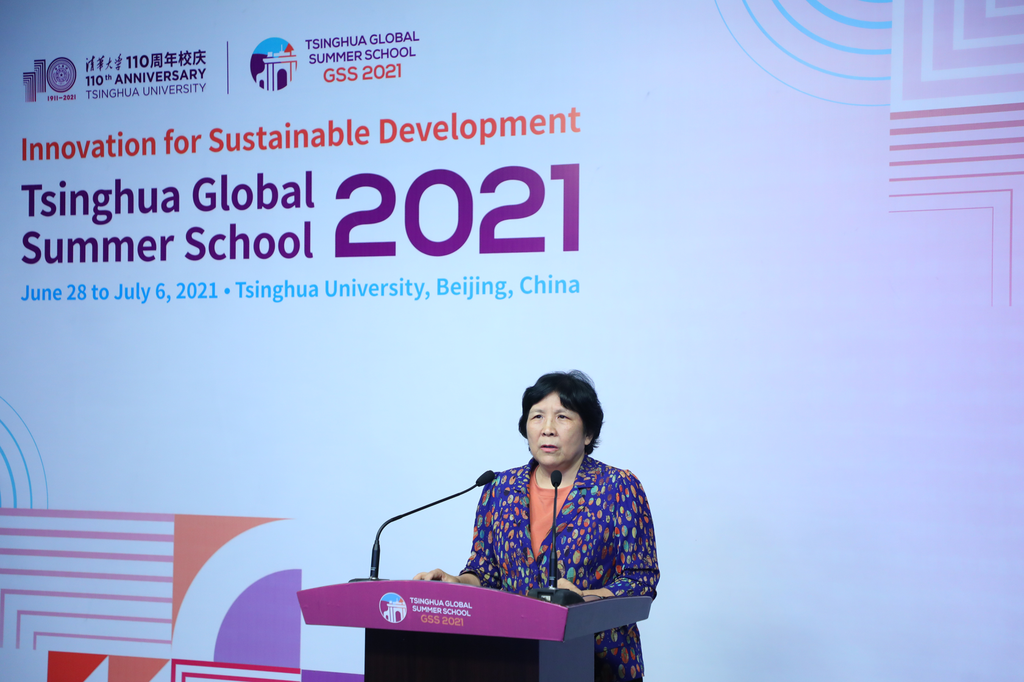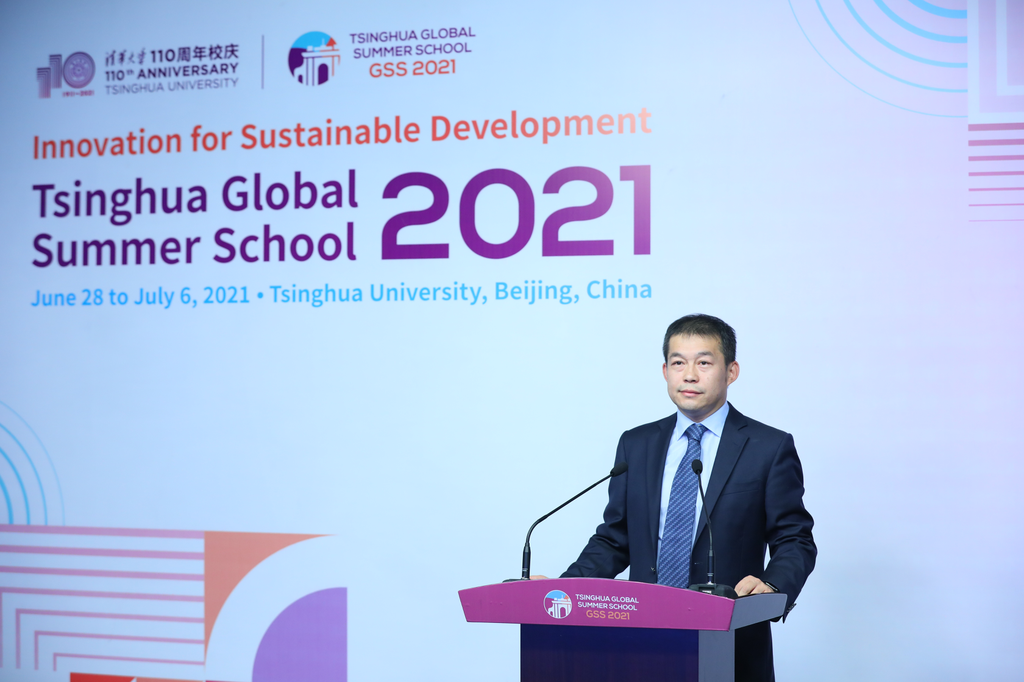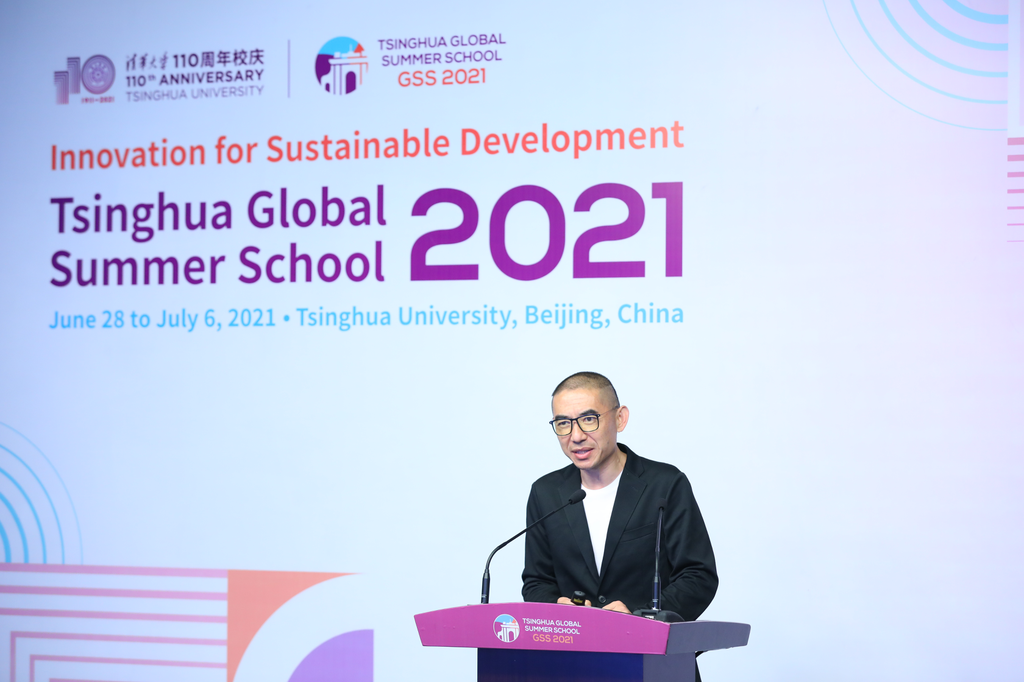On June 28, Tsinghua University’s Global Summer School 2021 (GSS 2021) officially kicked off. GSS2021 focuses on enhancing students’ understanding of sustainable development and their innovative thinking. One key component of the Summer School are the eight Masterclasses, in which experts in their fields are invited to share their frontier insights. After five unique Masterclasses, professors from different schools of Tsinghua University continued to deliver interesting content to the students. From July 2 to 4, the final three Masterclasses were delivered, namely by Professor Shi Jinghuan from Institute of Education, Associate Professor Teng Fei from the Institute of Energy, Environment and Economy, and Professor Zhang Li from School of Architecture.
Masterclass 6: To be an effective learner in a changing society: Insights on College Student Engagement Research

Professor Shi Jinghuan delivering the Masterclass
On July 2, Shi Jinghuan, Deputy Chair of the University Degree Committee, Professor of Institute of Education at Tsinghua University, delivered her Masterclass, entitled: To be an effective learner in a changing society: Insights on College Student Engagement Research.
She began with posing a series of questions about what is the impact of the rapid development of online and hybrid teaching on learners brought by the COVID-19 pandemic. She began by using Tsinghua University as an example of this rapid educational transformation. In early February 2020, Tsinghua adopted an anti-epidemic emergency measures to postpone the return to school whilst ensuring massive, real-time, and interactive online learning for all students, making it the first university in the world to transform to fully online teaching during the COVID-19 pandemic. In the two-week period that followed, the emergency pandemic response involved putting Tsinghua’s 4,471 courses online, and training over 50,000 students, 2,600 faculty, and 2,300 teaching assistants for online teaching and learning. Since September 2020, Tsinghua has provided a combination of online, offline, and hybrid learning with the goal to support all faculty and students to become effective online teachers and learners.
She then shared three key findings from the China College Student Survey (CCSS), a project she has initiated and led since 2007. Today, having surveyed over one million students across China, CCSS is one of China’s largest and most important longitudinal study in college students. CCSS has provided valuable evidence-based research to understand student learning and to support institutional to national higher educational reform and innovation.
First, CCSS discovered a marked increase in college students’ ICT skills in China from 2011 to 2019. In particular, between 2016 to 2019, higher level of participation of online learning was found to be positively correlated with learning motivation, higher ICT skills, professional competence, and holistic development. Secondly, CCSS found that first-generation-college-students (FGCS), compared with that of non-FGCS, had lower level of participation in online learning and also in high-impact practices (HIPs), such as research, social practice and extended language learning. Thirdly, CCSS highlighted the crucial role of active interactions of students with their teachers and peers in enhancing both online and offline learning.
She concluded that effective learners thrive in an integrated institutional environment that enriches learning-centered social interaction with comprehensive academic, financial, social, and career development support.
Masterclass 7: Global Transition towards Carbon Neutrality

Associate Professor Teng Fei delivering the Masterclass
On July 3, Associate Professor Teng Fei, Deputy Director of the Institute of Energy,Environment and Economy, Tsinghua University, delivered his masterclass entitled "Global Transition towards Carbon Neutrality" to the Summer School students. The masterclass introduced the pathways, policies and challenges of the global transition to carbon neutrality, and introduced key research frontiers in the field of climate change from perspectives of climate science, economics, ethics and political science.
Professor Teng first introduced how extreme weather in March 2021 led to the grounding of the Ever Given and the shutdown of the Suez Canal.Using the Suez Canal shutdown as an example, Professor Teng Fei then introduced how climate change has significantly affected natural ecosystems and human social systems. He explained the importance of global temperature goal in reducing climate risks from a risk management perspective, and analyzed the carbon neutrality targets proposed by countries to control global temperature rise and the implications of those carbon neutrality goals. Professor Teng Fei also presented the global transition pathway towards a carbon-neutral energy system, and detailed the main characteristics of these transition pathways. He then analyzed the challenges of the carbon neutrality transition, especially in the area of fossil energy phase out and negative emissions technologies.
At the end of the masterclass, Professor Teng Fei reviewed the successful experience of the Paris Agreement in resolving the "zero-sum game" dilemma. He concluded that climate change is one of the greatest risks facing human society and that the only way to effectively address this challenge is through enhanced international cooperation. Professor Teng Fei hoped that the Summer School students would actively engage in research and action to address climate change in the future and contribute innovative solutions to global climate change.
During the Q&A session, students actively asked questions such as what is the biggest barrier to achieving the 1.5 degree target globally and what are the consequences if the temperature goal is not achieved, with Professor Teng Fei providing detailed responses.
Masterclass 8: Two Slopes, Two Approaches to Sustainability: designs of the National Ski Jumping Centre and Shougang Big Air for the Beijing Winter Olympics 2022

Professor Zhang Li delivering the Masterclass
On 4 July, Professor ZHANG Li, Dean of School of Architecture, Vice Principle of Architecture Design and Research Institute (THADI), Tsinghua University, delivered his Masterclass entitled "Two Slopes, Two Approaches to Sustainability: designs of the National Ski Jumping Centre and Shougang Big Air for the Beijing Winter Olympics 2022". Professor ZHANG Li is currently the Architect-in-Chief of the Zhangjiakou Zone and Shougang Big Air for the Beijing 2022 Olympic Winter Games. He is also the curator of China Pavilion in Venice Architecture Biennale 2020.
In his lecture, Professor ZHANG Li clarified in detail the designs of the National Ski Jumping Centre and Shougang Big Air for the Beijing Winter Olympics 2022 (Beijing 2022). He said the design of the Beijing 2022 venues emphasize post-game use and sustainability. The Beijing zone which is the metropolitan zone that features ice-sport, is primarily focused on the reuse of existing structures and the integration of the new venues with the city’s long-term renovation and urban renewal projects. The Zhangjiakou zone which is the mountain zone, is mainly focused on the creation and integration of the outdoor environment.
Professor ZHANG Li noted that both the National Ski Jumping Centre and the Shougang Big Air embody the sustainable strategies of Beijing 2022. The former integrates Winter Games construction with long-term development of the mountain region through creating large scale infrastructure and internationally renowned outdoor activity destinations. The latter brings new ways of thinking into the urban renewal of Beijing by taking advantage of the Winter Olympic to promote the reuse of industrial heritage, to provide new ways of thinking for Beijing’s urban renewal and community development.